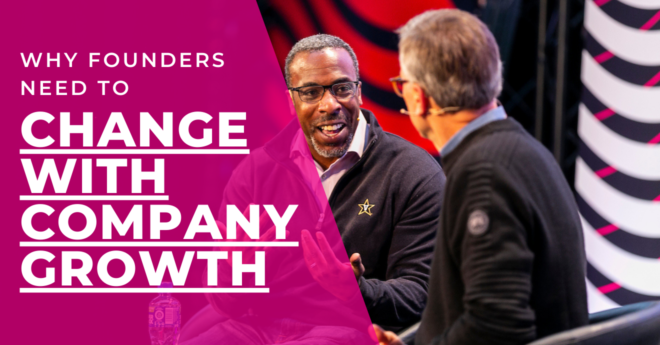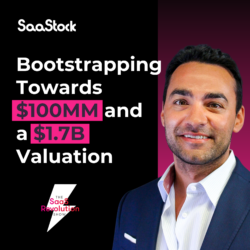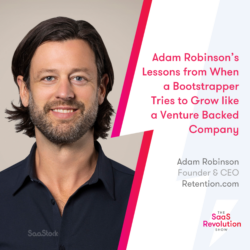The person who founded your SaaS company isn’t the same as the person who will help grow it past eight figures ARR and onward to IPO. Almost every SaaS leader who achieves those feats has taken steps to scale themselves alongside their company — and you’ll need to do the same.
Whether adopting certain mindsets or developing new skills, startup founders need to grow in order to help their companies succeed, says Keji Mustapha, global director of brand and community at tech investor Partech, on our podcast The SaaS Revolution Show.
Traits and Skills
Self-awareness and humility are vital traits for founders looking to scale, Mustapha notes. Because founders have very generalist roles, they need the self-awareness to know when they aren’t doing a task as well as someone else might be able to.
Founders get into trouble when they hold onto roles too long because the company’s their baby. Instead, they need to have:
- The humility to check their ego.
- The knowledge that they aren’t the best person to fulfill the role.
- The appreciation that there are more important things they should be working on.
- The ability to delegate the task.
This can be difficult for founders who are used to carrying a heavy load — especially when a lack of humility can be vital in getting your business off the ground in the first place.
But different stages of company growth necessitate different skills, says Dennis Van Der Heijden, founder and CEO at testing tool Convert. Once your business is passed the MVP stage like his, you need different skills compared to that of a startup. It’s why he strives to hire good team members and mentors.
“The ability to be humble when you should be (despite success and experience) is incredibly valuable,” says James Shomar, cofounder and principal at Coffeehouse CxO, a corporate innovation company. Humility keeps founders honest and allows them to consider criticisms, ideas and opportunities that can grow their business even further.
Hire Rockstars (and Get Out of Their Way)
Once you have the self-awareness to understand you need help, you’ll also need to develop the hiring skills to find rockstar employees, says Mustapha.
As Carol Dweck, psychologist and author of “Mindset” says, great leaders “surround themselves with the most able people they can find, they look squarely at their own mistakes and deficiencies, and they ask frankly what skills they and the company will need in the future. And because of this, they can move forward with confidence that’s grounded in the facts, not built on fantasies about their talent.”
Hiring great people isn’t enough, adds Mustapha. Things go wrong when founders hire great people but fail to give them the autonomy they need to succeed. You have to get out of their way so they can excel. In other words, delegating is another skill founders need to learn.
Entrepreneur Kenny Schumacher says “delegation is the key to growing and scaling.” It’s perfectly okay for founders to do a lot of the work themselves at first, but you need to build out standard operating procedures and processes so that others can take the work off your plate.
Founders need to learn that done is better than perfect as part of this process. Most founders hesitate to delegate because they don’t think the job will be done as well as they can do it, says Schumacher. “But the reality is that even if they’re only 60% as effective at the job as the entrepreneur, it still gives you many more hours to focus on other areas. Over time the people you hire will get better and will probably do that job better than you can.”
Set Boundaries
It’s admirable to go all-in on your company, but it’s a surefire way to lead to burnout and disappointment, Mustapha warns. The founders who don’t set boundaries can become isolated and miserable. And their company will start to suffer as a result.
Setting boundaries is difficult for founders whose life revolves around their startup. Following the principles that have allowed CEO coach Dave Bailey to succeed can help:
- My emotional wellbeing is my own responsibility.
- My long-term emotional wellbeing is more important than my company’s success.
- To protect my emotional wellbeing, it’s okay to say ‘no’ without feeling guilty.
Your mood and disposition affect the entire company, says Mustapha. So you owe it to yourself and your company to set boundaries and make time for things outside of work so that you can bring your best self to your job. If more founders did that, they’d enjoy what they’re doing even more.





